George Michael, an iconic figure in the music world, had a complex relationship with fame and appreciation. While he enjoyed immense popularity during his career, it often seemed that many who claimed to be fans didn’t fully recognize his status as a legend until after he passed away. This phenomenon raises important questions about what it means to truly celebrate an artist’s legacy.
Throughout his life, Michael’s work resonated with millions, showcasing his incredible talent as both a singer and a songwriter. From his early days with Wham! to his successful solo career, he crafted songs that not only topped charts but also touched the hearts of listeners. However, many fans only acknowledged his impact and significance after his untimely death, which is a bittersweet reflection on the nature of celebrity culture.
The sudden outpouring of grief and admiration following his passing illustrated a collective realization of what he represented in the music industry. It’s a reminder of how easy it can be to take an artist’s contributions for granted while they are still with us. Genuine appreciation often seems to emerge in the wake of loss, prompting reflections on how we engage with the artists who shape our lives.
Moreover, this pattern speaks to a broader issue within fan culture. Many who identified as fans may not have actively supported his work or engaged with it on a deeper level until it was too late. This highlights the importance of recognizing and celebrating an artist’s contributions in real time rather than waiting for a tragic event to prompt acknowledgment.
Ultimately, George Michael’s legacy serves as a poignant reminder to appreciate artists while they are alive. By embracing their work and recognizing their influence, we can foster a richer cultural landscape where true legends are celebrated in their lifetimes, ensuring their impact is honored both during and beyond their years.

